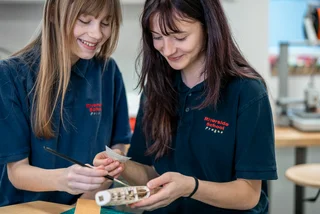Written by by Caroline Studdert
For IWAP’s ‘The Bridge’ Magazine
In 1995, Kevin Capuder came from the U.S. to teach at Comenius University in Bratislava, Slovakia for a year as part of the Civic Education Project (CEP). From 1996-2002, he taught at Palatsky University in Olomouc, moving to chair the School of Business Administration at the New Anglo-American College in Prague from 2002 to 2004, when he became Interim President of the College, located in the fine Maltese embassy building off Malá Strana´s lovely Maltezska namesti. In an interview with the Bridge, he assess the state of play in higher education in the Czech Republic in the state and private sectors, both of which he knows from the inside.<?xml:namespace prefix = o />
The Civic Education Project (CEP) was set up to help re-establish social sciences in the post-communist world – strait-jacketed by Marxism-Leninism under communism. (“Basically, everyone had to take their Marxism-Leninism classes; nobody did and they all used cheat sheets and got through it somehow”). In fields such as history, sociology and economics, the ideological Marxist programme did not permit open ideas, so the Civic Education Project was set up to re-establish all of that – originally funded by Soros. “I can remember thinking originally I´d come for a year – now I´m still here!”
Even disregarding ideological content, Capuder says the system under communism was built on an old model of education. Lecturers gave lectures, and students did exams. “Very little critical thinking took place in classes, very little independent investigation took place. It was a matter of rote learning”. A key factor was the lack of any system of open libraries where everyone was free to gather material. The CEP was designed to help change all this.
“It had varying success. But of course, projects like that when you bring in outsiders – in those days, it was all outsiders – meet with a lot of resistance. People are resistant to change anyway by nature, but also there was resentment of foreigners coming in and telling people how to do it. Nonetheless, the science department I worked in at Palatsky was very progressive and reforming – a lot of success was achieved there”.
From his experience, Capuder considers the key to success is simply a willingness to change – “people who were willing to get involved”. A driving force in Palatsky was former director Josef Jařap, now a Senator, “who wanted to get the university much more involved with Western institutions, and did so very quickly after 1989. He basically said yes to any project – that was the right way to go at the time. But still, even with him at that university, there were pockets and I would say remain now pockets that operate almost exactly as they did before”.
“Part of it in the Czech state system is structural – there´s not a lot of money in state education, so it´s not really a very attractive career path for a young scholar. PhDs generally can do a lot better in the private sector than they can teaching in the state system. This is still true today, even in Prague. I think one day they´re going to have to institute tuition as a partial funding (function) of the state system. There is some talk of that now”.
Capuder believes slowness of change cannot be entirely blamed on the former regime. “This was very much a Central European style of education, very different from what you would find in Germany”. In effect, it created an opportunity for private schools “to come in and do some things differently”. But he agrees that it is worrying that while private schools are doing well, the state system is languishing. “They have expanded the number of chairs in the state system, but studies have shown that´s not made a huge amount of difference”. Also worrying is that although lower level education is generally good, “I see that declining, in incoming students just out of secondary school, in particular maths and science skills, whereas the Czech Republic had always scored very highly here in international comparisons”.
But the big issue is access to tertiary education. The Czech Republic produces an extremely low number of university graduates – compared with, say, Scandinavia, or Ireland. “Unless we´re targeting 50 percent of the population, we´re not going to be preparing people for the jobs which are there, which are all about information. Sure, this is not a backward place in terms of the internet and so on, no argument there, but there aren´t enough people (coming on) – and it´s not a matter of being technically savvy, it´s a matter of being information savvy. The jobs that are going to be created in the future are not going to be manufacturing items, they´re going to be service sector related jobs, where the higher the level of communication and effectiveness of communication, the more you´re going to succeed”.
Capuder notes that Business Administration has always been the most successful part of Anglo-American College. “This is unheard of in the Czech system, which teaches perhaps business management, pure economics, which is not the same. To this day, there´s no such thing as an MBA in the Czech Republic, these are all foreign degrees. Now this is part of the resistance to change that you can see clearly, because the ministry of education has always felt that this is not an academic pursuit, and this has to do with what your view of education is. Is the purpose of what you´re doing to create scholars, or is it to prepare people for the rest of their lives?
“I would say the Czech Republic probably produces too many people who are trained in economics – there are tons of people here who graduate with degrees in economics. I´m not saying it´s not useful, but in the real world, there are very few jobs purely for that”. Realistically, most do people do other things, so Capuder favours “more focus on what people are going to be doing in their lives; less focus on the theoretical and more on the practical Our Czech graduates have no problem getting jobs.
Capuder also notes a lack of flexibility in the Czech educational system. “This is our advantage here, our average student is older than the undergraduate in the Czech system. Because most of them work – at least part time”. In the Czech system, “once you´ve missed your window of opportunity at 19, you have no options. You can go back, but you go through all the exams just as if you were 19. Supposing you´ve gone to university for two years and decided this is not what you want to do. Then you have to start again in another field. They´re only really beginning to implement things like credit systems here”.
Students at Anglo-American are 65% Czech plus a mixture of other Central and Eastern Europeans and some Westerners and Americans. All programmes are taught in English, providing an important “demonstrated skill” of being able to work in as well as speak a language, says Capuder. With its founding mission of teaching in a Western, Anglo-American manner “rather than the traditional Central European lecture and spit-it-back mode”. Capuder believes his college provides an opportunity “outside of the normal set of opportunities in the Czech system. We are preparing people for their working lives – this is not to say that you can´t get a BA from here and go forward to an MA and then go on and be an academic. But it´s a recognition that 90% of our students are not going to follow that path”
by Caroline Studdert
The International Women´s Association of Prague is an independent, non-political and non-profit organisation. It aims to promote friendship among women of all nationalities residing in the Czech Republic; to acquaint foreign members with the life and culture of the Czech Republic and identifies charities to which our members can contribute their talents and resources for the benefit of our host country. Visit : www.volny.cz/iwap for more information












 Reading time: 6 minutes
Reading time: 6 minutes 





















